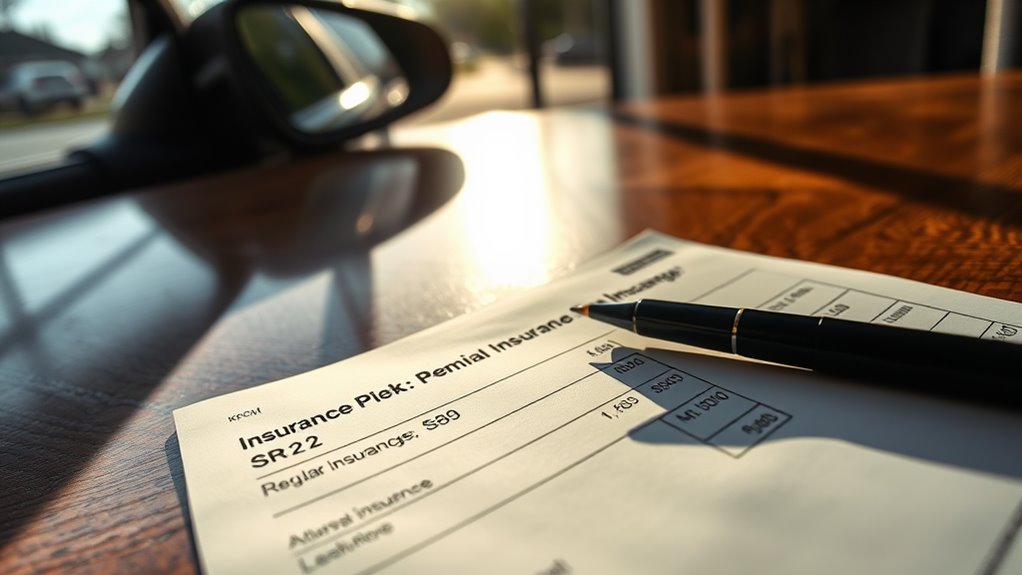What Is SR22’s Impact on Insurance Costs?
Imagine maneuvering a maze where every wrong turn costs you more than the last; that's what dealing with SR22 insurance feels like for many drivers. After serious violations, the financial burden can skyrocket, with average annual premiums exceeding $2,700. Understanding the factors that contribute to these costs is essential. What influences these steep rates, and how can you find more affordable coverage amidst the chaos?
Key Takeaways
- SR-22 insurance significantly increases premiums, averaging over $2,700 annually, with some states like Michigan exceeding $8,324.
- High-risk drivers face costs that can be double those of regular insurance due to increased claim likelihood.
- The type of violation, such as DUI, and driving history are major factors influencing premium rates.
- Location and vehicle type also affect insurance costs, with newer models typically attracting higher rates.
- Maintaining a clean driving record and continuous coverage can help manage and potentially lower SR-22 insurance costs over time.
Understanding the Cost Implications of SR22

While maneuvering through the complexities of auto insurance, understanding the cost implications of an SR-22 is essential for drivers facing this requirement.
An SR-22 serves as proof of your minimum auto insurance coverage but doesn't constitute an insurance policy itself. The average annual cost for SR-22 insurance exceeds $2,700, with significant state variations—Michigan residents may pay up to $8,324. Generally, SR-22 insurance can be twice as costly as regular car insurance due to the higher perceived risk associated with drivers needing this certification. Insurers often charge higher premiums for high-risk clients due to their tendency to file more claims. Many drivers seeking affordable SR22 insurance may find it challenging to secure low rates given the increased scrutiny from insurers.
Though the filing fee ranges from $15 to $50, it pales in comparison to the ongoing premium increases, making it vital for you to budget effectively while meeting your legal obligations.
Factors Influencing Premium Increases
Understanding the factors that influence premium increases is essential for drivers required to obtain an SR-22. The type of violation prompting the SR-22, such as a DUI, considerably affects your insurance costs—serious offenses lead to higher premiums.
Your driving history before filing also plays a critical role; past infractions can result in elevated rates. Additionally, location matters; state-specific regulations and SR-22 requirements vary, impacting overall costs.
The type and age of your vehicle can further influence premiums, as newer models typically incur higher rates. Finally, some states consider credit scores, where lower scores may lead to increased insurance costs, further complicating your SR-22 situation.
Understanding these factors can help you anticipate potential premium increases.
Strategies for Finding Affordable SR22 Insurance
Steering through the complexities of SR22 insurance can be intimidating, especially when looking for affordable options. To find the best rates, start by comparison shopping among multiple providers.
Consider bundling your SR22 with other insurance types, which can considerably reduce overall costs. If you don't own a vehicle, explore non-owner policies, as they're often more affordable.
Completing defensive driving courses may also qualify you for discounts. Look for specialized insurers that cater to high-risk drivers; they typically offer competitive rates.
Adjust your policy by meeting only state minimum coverage limits and raising deductibles to lower premiums. Remember to maintain continuous coverage and a clean driving record to help manage costs over time.
Conclusion
In conclusion, SR22 can be a financial burden, raising your insurance costs considerably. With premiums often doubling due to your driving history, it's essential to understand the factors at play. However, by exploring your options and comparing different providers, you can find a policy that won't break the bank. Remember, you're not just paying for insurance; you're investing in your peace of mind. Don't let this situation cloud your judgment—stay proactive and keep your finances on track.
